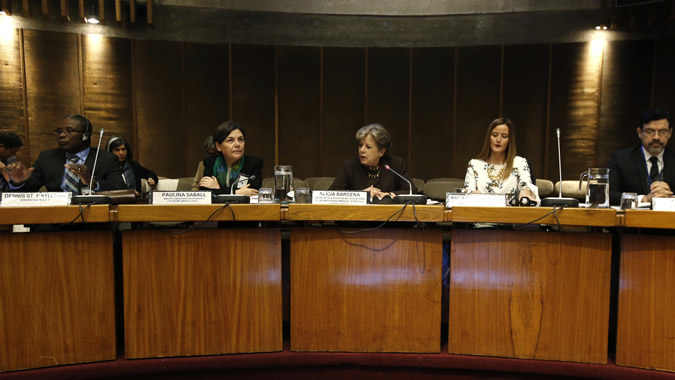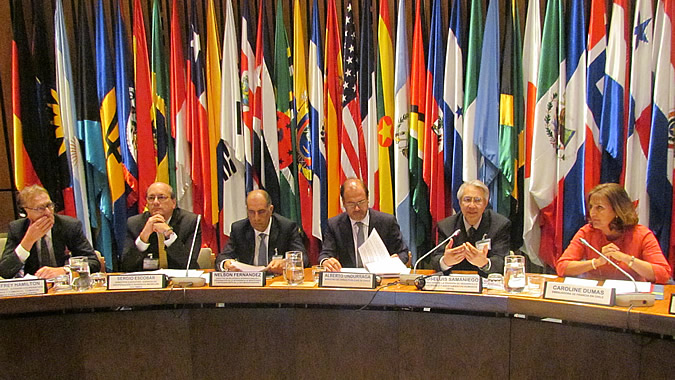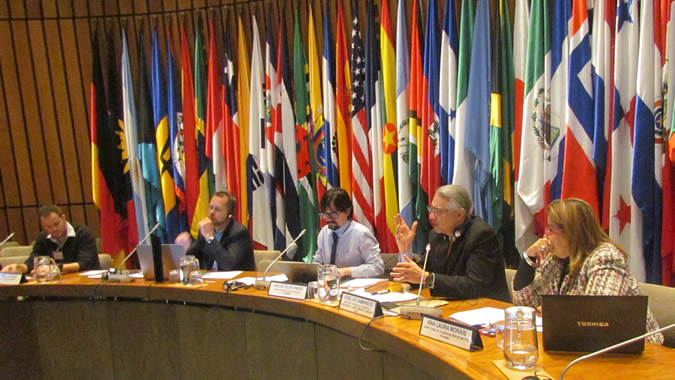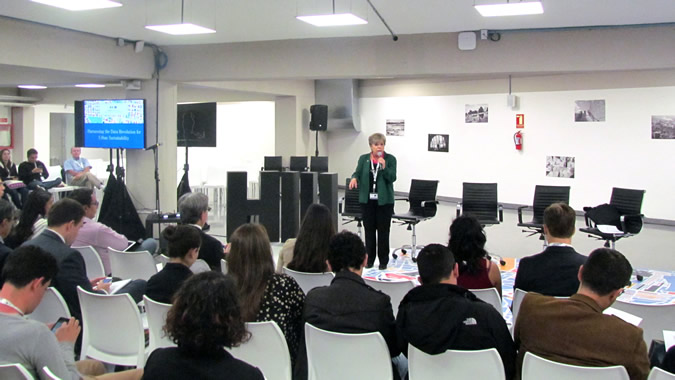Latin American and Caribbean Countries Urge Construction of Cities Centered on Equality, Sustainability and Productivity
Work area(s)
In the context of the inauguration of the Cities Conference, Alicia Bárcena, ECLAC’s Executive Secretary, presented the Regional Action Plan for the implementation of the New Urban Agenda.

Representatives of the countries of Latin America and the Caribbean today called for the construction of cities centered on equality, sustainability and productivity, during the inauguration of the Cities Conference being held through Friday, October 6 at the Economic Commission for Latin America and the Caribbean (ECLAC) headquarters in Santiago, Chile.
The Conference, co-organized by ECLAC, MINURVI and UN-Habitat, was inaugurated by Alicia Bárcena, ECLAC’s Executive Secretary; María Soledad Núñez, Paraguay’s Minister of Housing and Habitat and South American subregional representative of MINURVI; Paulina Saball, Chile’s Minister of Housing and Urban Planning; and Elkin Velásquez, Director of UN-Habitat’s Regional Office for Latin America and the Caribbean.
During her remarks, Alicia Bárcena mentioned that Latin America and the Caribbean is the most urbanized developing region in the world, adding that, if the United States and Canada are added, it is the most urbanized continent on the planet.
ECLAC’s Executive Secretary said that the countries of the region are undergoing a mature and consolidated urbanization process compared with other regions of the world, albeit with differences and asymmetries within countries and among different subregions.
However, she stated that, according to current estimates, in 2030 there will be more than 92 million additional people living in cities in the region, entailing significant additional demand for services, equipment, mobility, housing and urban land.
The senior ECLAC representative underlined that, despite significant progress made to reduce poverty rates, regional metropolises, large cities and medium and small human settlements are still marked by disparity, with high degrees of socioeconomic residential segregation.
Most capital cities in the region exceed the inequality warning line (Gini coefficient of 0.5), Bárcena indicated.
“Socioeconomic segregation – the spatial expression of inequality – deepens inequity and contributes to social fragmentation and the high levels of violence that characterize many cities in Latin America and the Caribbean,” she affirmed.
Therefore, she added, it is necessary to guarantee the right to the city as a basic requirement for achieving sustainable development.
During the inauguration, ECLAC'S Executive Secretary presented the Regional Action Plan for the implementation of the New Urban Agenda in Latin America and the Caribbean, a document that proposes interventions and actions, in addition to pertinent and priority policies for the countries of the region, to work toward the sustainable development of its cities and human settlements going forward to 2036.
The Regional Action Plan is a proposal developed by ECLAC, MINURVI and UN-Habitat with the aim of enabling cities and human settlements to consolidate their ability to act as the “engines” of sustainable development. It contains six action areas and strategic objectives that are fundamental components for implementing the New Urban Agenda in the region and thus achieving inclusive, safe, resilient and sustainable cities and human settlements.
The Plan’s six action areas are 1) National urban policies; 2) Urban legal frameworks; 3) Urban and territorial planning and design; 4) Financing urbanization; 5) Local implementation; and 6) Monitoring, reporting and revision mechanisms.
“The Regional Action Plan sets concrete objectives that help us to have a very clear roadmap for implementation of the New Urban Agenda,” affirmed Paraguayan Minister María Soledad Núñez.
She added that the Plan allows us to differentiate countries according to their specificities, which helps in the drafting and implementation of more effective public policies.
Chilean Minister Paulina Saball meanwhile underscored that collaboration between the countries of Latin America and the Caribbean on implementation of the New Urban Agenda is the foundation for forging a regional identity and advancing toward sustainable development.
Finally, Elkin Velásquez stressed that the Regional Action Plan positions the region as an example to the world.
“Latin America and the Caribbean is taking the New Urban Agenda and putting it at the center of the 2030 Agenda,” Velásquez underlined.
In the framework of the meeting, the Subregional Action Plan for the Caribbean was also presented, which considers the specificities of that subregion and is guided by the need to develop resilient communities, cities and territories.
Related content

Autoridades y expertos debaten en CEPAL importancia de asociaciones público-privadas para un desarrollo urbano sostenible
Diálogo sobre la cooperación entre ambos sectores se realiza en el marco de la Conferencia de las Ciudades, que se prolongará hasta el viernes 6 de octubre en Santiago, Chile.

Cities Conference Concluded at ECLAC with Session on Mobility and Sustainable Urban Transportation
Experts meeting in Santiago, Chile debated good practices and public policy recommendations for strengthening the management of cities in Latin America and the Caribbean.

At Habitat III, ECLAC Urges Harnessing the Data Revolution to Drive Sustainable Urban Development
Alicia Bárcena, Executive Secretary of ECLAC, attended a side event at the United Nations Conference on Housing and Sustainable Urban Development.
Country(ies)
- Latin America and the Caribbean